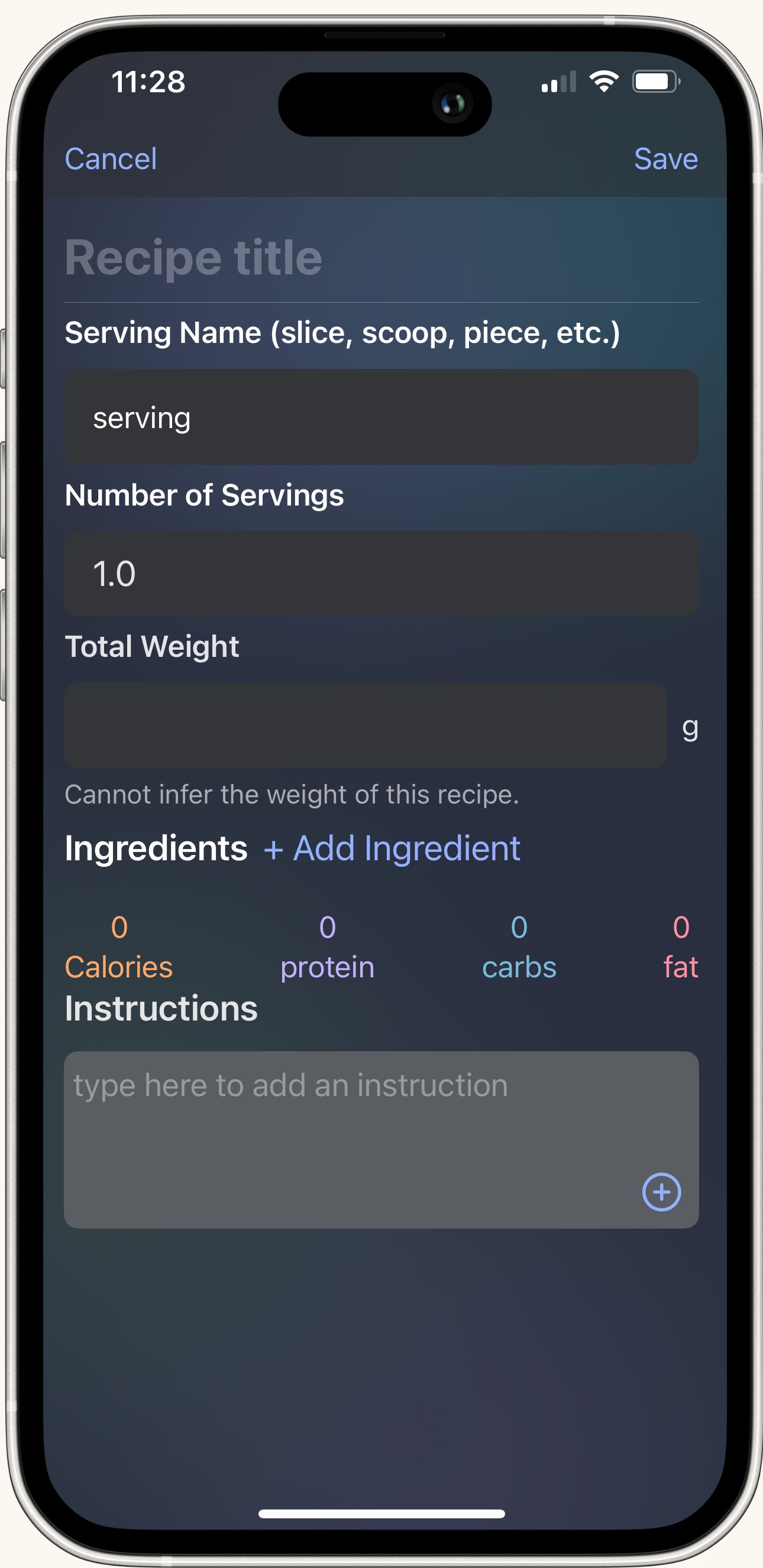Eating the same breakfast every day? Can't find a food in our database? TCT lets you create recipes and custom foods so logging becomes faster and more accurate over time.
Why Create Recipes
Recipes save massive time when you:
- Eat the same meals repeatedly (weekly meal prep, daily breakfast, etc.)
- Make homemade dishes with multiple ingredients
- Want to log an entire meal with one tap
Instead of searching for and adding 8 ingredients every time you eat your breakfast bowl, save it as a recipe once and log it in seconds from now on.
How to Create a Recipe
Step 1: Access Recipe Builder
Two ways to get there:
Option 1: Tap the book icon from the Food Logger → Select "Add a Recipe"
Option 2: Use the Convenience Menu (blue box with ...) → Select "Create Recipe"
Step 2: Fill in Recipe Details
You'll see a form with these fields:
Recipe Title (Required) Give it a clear name you'll recognize later.
- Good: "Morning Protein Oatmeal"
- Bad: "Breakfast 1"
Serving Name (Required) How do you portion this recipe?
- Examples: slice, scoop, bowl, cup, plate
Number of Servings (Required - Very Important!) This determines how TCT divides the nutrition data.
Example: Your recipe makes 4 servings. You eat 1 serving = 25% of total nutrition.
Total Weight: This will automatically accumulate as you add your ingredients. If this is important to you, be sure to accurately input the volume of the ingredient.
Step 3: Add Ingredients
Tap "+ Add Ingredients"
Now use any of the standard logging methods:
- Barcode scanner
- Text search
- Favorites
Add every ingredient with accurate amounts. TCT calculates the total nutrition automatically.
Step 4: Add Instructions (Optional)
Want cooking notes? Add step-by-step instructions so you remember how to make it.
This is helpful for complex recipes you only make occasionally.
Step 5: Save
Tap Save. Your recipe is now stored and ready to use anytime.
Logging a Saved Recipe
To access your recipes:
- Tap the book icon (from Food Logger or Convenience Menu)
- Select "Recipes"
- Choose your recipe from the list
- Select how many servings you're eating
- Done!
TCT automatically calculates the nutrition based on the serving size you choose.
When to Use Custom Foods
You probably won't need this often. TCT provides access to millions of food items through a premium, verified database that combines commercial nutrition data with internationally vetted sources. We've invested significant effort curating this database—removing duplicates, filtering low-quality entries, and ensuring accurate results. It's one of the most comprehensive food databases available.
That said, if you eat something obscure (local bakery items, international products not widely distributed, homemade items from small producers), the label reader has you covered. Add it once with our AI tool, and it's yours forever.
How to Add a Custom Food
Step 1: Access Label Reader
Tap the book icon → Select "Add Custom Food"
Step 2: Take Three Photos
TCT will walk you through capturing:
- Nutrition Facts panel - The label with calories, macros, vitamins, etc.
- Ingredients statement - The list of ingredients (usually on the back)
- Barcode - So you can scan it next time instead of searching
Pro tip: Make sure the photos are clear and well-lit. The AI reads better with sharp images. You can also crop the picture to ensure you are providing the best picture for the AI tools to evaluate.
Step 3: Verify the Data
IMPORTANT: The AI does a great job, but always double-check.
TCT will show you what it extracted:
- General food info (name, brand, serving size)
- Nutrition data (calories, macros, micros)
- Ingredients list
- Allergens
Compare it to the package. If anything is wrong, just tap the field and edit it manually.
Common things to verify:
- Serving size (1 cup vs. 1 container)
- Allergens (AI might miss "contains milk")
- Unusual ingredients
Step 4: Save and Log
Tap "Save and Log"
The food is now:
- Added to TCT's database for you permanently
- Automatically logged to your current meal
Next time: Just select the item from your custom foods list.
Quick Tips
For Recipes:
✅ Use clear, descriptive names - You'll have many recipes eventually
✅ Get the serving count right - This affects all your nutrition calculations
✅ Add ingredients with exact amounts - Don't estimate
✅ Update recipes if you change how you make them - Edit anytime
For Custom Foods:
✅ Take clear, well-lit photos - Better photos = better AI accuracy
✅ Always verify nutrition data - Don't blindly trust the AI
✅ Check allergen detection - AI sometimes misses these
✅ Save the barcode - Makes future logging instant
Why This Matters
Recipes make consistent logging effortless. Your daily routine becomes a few taps instead of minutes of searching.
Custom foods ensure you never have missing data. Even obscure international products or local bakery items can be logged accurately.
Together, they make TCT faster and more complete the longer you use it.
Bottom Line: Create recipes for meals you eat regularly to save time. Use the label reader when you find a food we're missing—it takes 2 minutes to add, then it's available forever. The more you customize TCT to your eating habits, the faster logging becomes.

